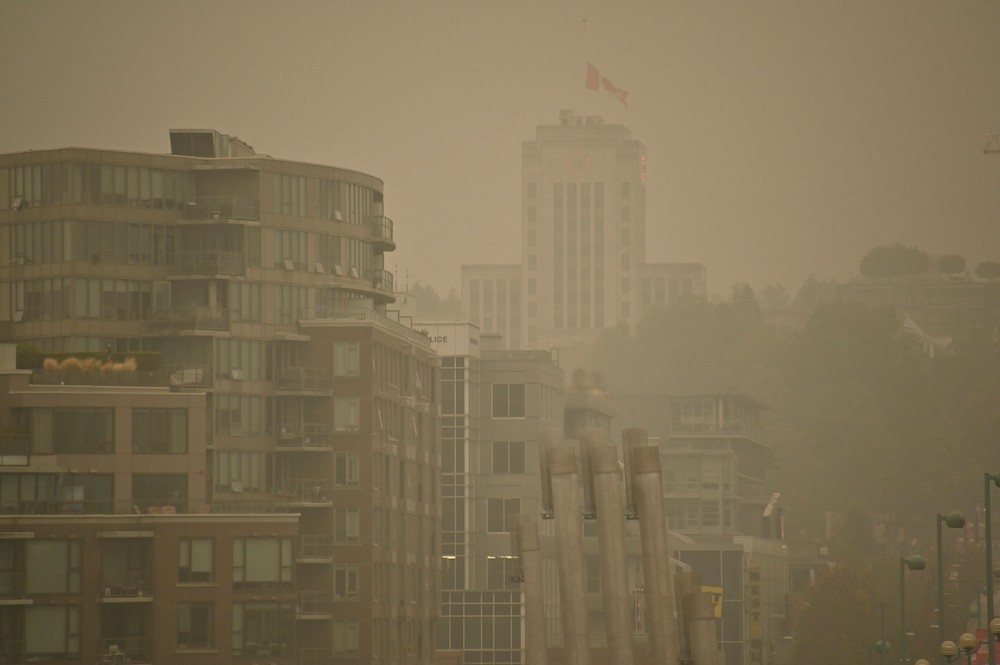Canadian pundits and politicians are entertaining themselves over carbon taxes and heating oil, while environmentalists protest pipelines and missed emissions targets. They’re all wasting their breath — and our precious time.
The recently published "Canadian Net-Zero Emissions Accountability Act — 2030 Emissions Reduction Plan" says, in its first sentence, “The federal government is not on track to meet the 2030 target to reduce greenhouse gas emissions by at least 40 per cent below the 2005 level by 2030.”
Even if we were on track, it wouldn’t matter. Global emissions will keep going up because no one else is on track to reduce their emissions either.
According to the Global Carbon Atlas, the world’s total carbon dioxide emissions in 2021 were 36,853 megatonnes. China was far and away the top emitter, with 11,336 megatonnes, more than twice the 5,032 megatonnes emitted by the United States. India was third in emissions, with 2,674 megatonnes, followed by Russia with 1,712 megatonnes.
Canada is well back in the pack at 11th place, with just 537 megatonnes of CO2 emitted.
14 tonnes of CO2 per Canadian
Granted, on a per capita basis we’re pretty good emitters: each of us pumped 14 tonnes of CO2 into the atmosphere in 2021, just behind the 15 tonnes cranked out by each American. China’s 1.4 billion people emitted only eight tonnes per capita. By comparison, Qatar — with a small population and major emissions — emitted 40 tonnes per capita.
Using data from the Global Carbon Atlas, a website called Visual Capitalist recently published a chart showing that Canada produces just 1.5 per cent of all global emissions. Even if we all bought Teslas and heat pumps today, we wouldn’t postpone global temperatures rising by 1.5 C for more than six minutes.
This is especially true because the rest of the world is pumping, selling and burning all the fossil fuel it can find. Writing in the Globe and Mail, Eric Reguly cites International Energy Agency statistics predicting that “oil demand will increase to 105.7 million barrels a day by 2028, a new global high and six per cent more than 2022’s level.”
An International Energy Agency report on carbon emissions in 2022 notes that global emissions didn’t rise quite as fast as expected, but they still grew by 321 megatonnes of CO2 over 2021. The pandemic-driven fall in emissions in 2020 took us, briefly, all the way back to those in 2012 — about 34,000 megatonnes.
So imagine how we would get the world down to, say, the emissions of 1990: 21,300 megatonnes, which was already double the level of 1965 and four times the 4,900 megatonnes we emitted in 1941, the year I was born.
Meanwhile, the heat we’ve created in the atmosphere and oceans has triggered still more emissions, like methane from the seabed and CO2 from forest fires. One recent report says that Canada’s wildfires in 2023 produced 1.54 billion tonnes of CO2 (reported as 1.7 billion tons), triple our own fossil-fuelled emissions.
And James Hansen, who raised an early alarm about global warming almost 40 years ago, is among the authors of a new report warning of “global warming in the pipeline”: “under the present geopolitical approach to GHG emissions, global warming will exceed 1.5 C in the 2020s and 2 C before 2050.”
The United Nations Environment Programme has just clinched this bleak outlook in its "Emissions Gap Report 2023," saying: “As things stand, fully implementing unconditional Nationally Determined Contributions (NDCs) made under the Paris Agreement would put the world on track for limiting temperature rise to 2.9 C above pre-industrial levels this century. Fully implementing conditional NDCs would lower this to 2.5 C.” Cutting emissions back to bring global temperatures down to 1.5 C or 2 C would be the equivalent of shutting down China, the United States, India, Japan and Russia.
Back to the good old days
Why don’t we recognize the situation? Everyone around the world seems fixated on somehow stopping carbon and methane emissions and thereby stopping the rise in temperatures. Underlying that, I suspect, is a desire to go back to the good old days when climate was reasonable and we could grow economically with a clear conscience into an indefinite future.
But the science is telling us the good old days are gone forever; the more we grow, the sooner we will become very poor.
It may be that the climate denialists, even in the 1980s, knew this very well. They denied global heating because they saw it meant social and political change on a scale never seen before. An economic system that had made millions rich and billions at least comfortable would collapse. For those who’ve benefited from the system, death is less frightening than poverty.
What about the rest of us, who understood and trusted the science and could see the damage coming decades ago? Most of us contented ourselves with busywork: writing letters, liking Greta Thunberg’s tweets, putting out our recycling. Or buying an electric vehicle. Did we really think we could drive our Teslas through year after year of heat domes and atmospheric rivers?
System justification theory
We seem to have responded to endless emissions with “system justification theory” — which argues that even people harmed by a system will still support it. Two Simon Fraser University professors, Kiffer G. Card of the faculty of health sciences and Kirk Hepburn of the school of public policy, published a study of it in 2022.
In their study, Card and Hepburn write:
This study aimed to identify socio-demographic factors associated with system-justifying beliefs to better understand how they are maintained in Canada. In doing so, we hypothesized that (1) systems justification is a default cognitive position, buttressed by the palliative benefits of system-justification, (2) lack of success in a given system generally motivates people to doubt the legitimacy of that system, and (3) system-justifying beliefs are rejected only when the costs of doing so are low enough and/or the benefits are high enough to outweigh the innate needs-fulfillment benefits of system-justification.
Card and Hepburn concluded that “those benefiting from the status quo (e.g., healthier, wealthier, less lonely) were more likely to hold system-justifying beliefs. However, some groups who are disadvantaged within the existing system reported higher system-justification — suggesting that system oppression may be a key moderator of the effect of social position on system justification.”
This sounds strikingly like the “false consciousness” that Marxists attributed to workers who rejected revolution. And long ago, Machiavelli warned that it’s very hard to establish a “new order of things.” Whatever the term, it does help to explain how societies can recognize a threat yet do little or nothing to prevent it — unless the benefits are immediate and obvious, or the costs are trivial.
Could we afford to survive?
A serious social response to climate disaster would bring few benefits beyond survival, and the costs would be very high. On every level of government, the priorities would be repairing damage, climate-proofing infrastructure and keeping people fed and healthy.
Housing and transportation would be major concerns. This month Acapulco was almost destroyed by Hurricane Otis. A similar storm in Metro Vancouver could flood Richmond and Delta and smash most of the highrise windows in Vancouver’s West End and in Burnaby. Wildfires on the North Shore could destroy thousands of homes, fill the region with smoke and contaminate Vancouver’s water supply. We’ve already seen what an atmospheric river can do to rail lines and highways; we will lose them again and again, while most homes and businesses in B.C. become uninsurable.
Climate-driven health problems will make matters worse. The Lancet, a prestigious British medical journal, recently published a major report warning that “the multiple and simultaneously rising risks of climate change are amplifying global health inequities and threatening the very foundations of human health.”
Other sources predict high-humidity heat waves in Pakistan, India and China could cause hundreds of thousands of deaths within a few days, collapsing the countries’ health-care systems and then their economies. Similar heat waves in the Middle East would slow or halt oil and gas exports by incapacitating or killing the industry’s workers.
That, in turn, would raise the costs of air travel and ship and truck transportation, sharply increasing the costs of food and almost every consumer good. Everyone from iPhone assemblers in China to supermarket shelf stockers in B.C. could be out of work.
The collapse of the global economy would, like Ernest Hemingway’s famous quote on bankruptcy, happen in two ways: gradually, then suddenly. As in the early months of the pandemic, governments might provide a guaranteed basic income — not because they’re progressive but because they can’t let their people starve in the streets. But even basic income would be only a stopgap.
It’s at this point that system justification might finally break down. People would regard almost any solution as better than their present predicament, and we’d see many echoes of the Dirty ’30s with populist movements like Alberta’s Social Credit. We might also see a resurgence of socialism, defined as the equal distribution of poverty.
The next system will not likely be a clean, green, renewable-energy society. It will be a low-energy, low-consumption society much like Canada in the days of the Dust Bowl, still burning fossil fuels where it can afford them and sometimes making technological progress in climate-proofing homes or crops.
And it won’t bother with a carbon tax. The climate has already imposed that tax, and we’re going to pay it for the rest of our lives. ![]()
Read more: Politics, Environment

















Tyee Commenting Guidelines
Comments that violate guidelines risk being deleted, and violations may result in a temporary or permanent user ban. Maintain the spirit of good conversation to stay in the discussion and be patient with moderators. Comments are reviewed regularly but not in real time.
Do:
Do not: